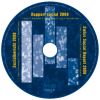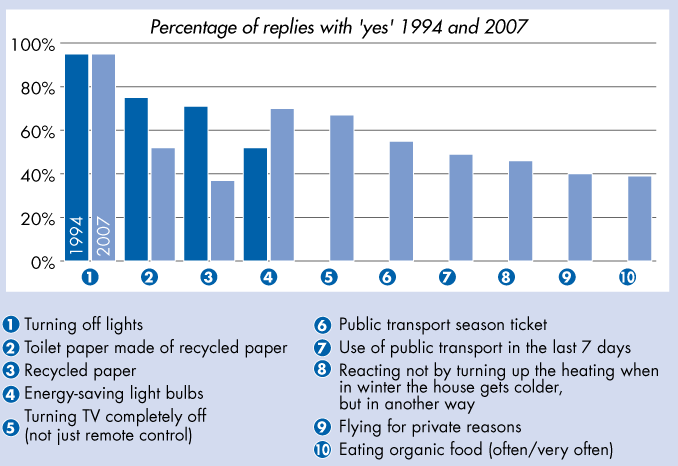Environment and society
Ecological behaviour
![]()
Which of the following measures do you put into practice?' - Percentage of replies with 'yes' 1994 and 2007
Question wording: ‘Do you turn off the light (with a normal bulb) when you leave a room for a short time, for example, for a quarter of an hour? Do you usually use toilet paper made of recycled paper in your household? If you write or print at home, do you usually use recycled paper? Do you use energy-saving light bulbs in your household? If you turn off TV for a longer period of time, do you turn it off by remote control or (also) completely? Do you personally own one or several public transport season tickets, such as a half-fare card, a general abonnement, or a point-to-point travelpass etc.? Which public transports have you used in the last 7 days for private reasons? If you’re at home in winter and it is colder than your preferred temperature, how do you react in the first place? Have you been flying for private reasons in the last twelve month? How often do you eat organic food at home?’
Answer categories: in general ‘Yes I do’, ‘No I don’t’. Percentages correspond to respondents who answered ‘Yes’. Turning off TV: ‘only by remote control, ‘completely/at the TV’, ‘only by remote control but I have a device in between the power socker and electrical device’, ‘I don’t have a TV/ I never watch TV’ ; Use of public transport in the last 7 days : ‘Train, metro, (small) local train’, ‘bus, postal car, tram, trolley’, ‘other’, ‘none (no use of public transport)’ ; Reaction in winter when house gets colder: ‘I turn up the heating’, ‘I call the caretaker’, ‘I light the fireplace etc.’, ‘I wear something warmer or I take a blanket’, ‘I’m never cold’ ; Eating organic food : ‘Never’, ‘Rarely’, ‘Occasionally’, ‘Often’, ‘Very often’.
Sample size: Swiss Survey on the Environment 1994: 2900; Swiss Survey on the Environment 2007: 3369; weighted data.
Source: Swiss Survey on the Environment 1994 and 2007, ETH Zurich.
Data for the indicator or in excel.
Description and explanation in the corresponding chapter of the Social Report 2008.

